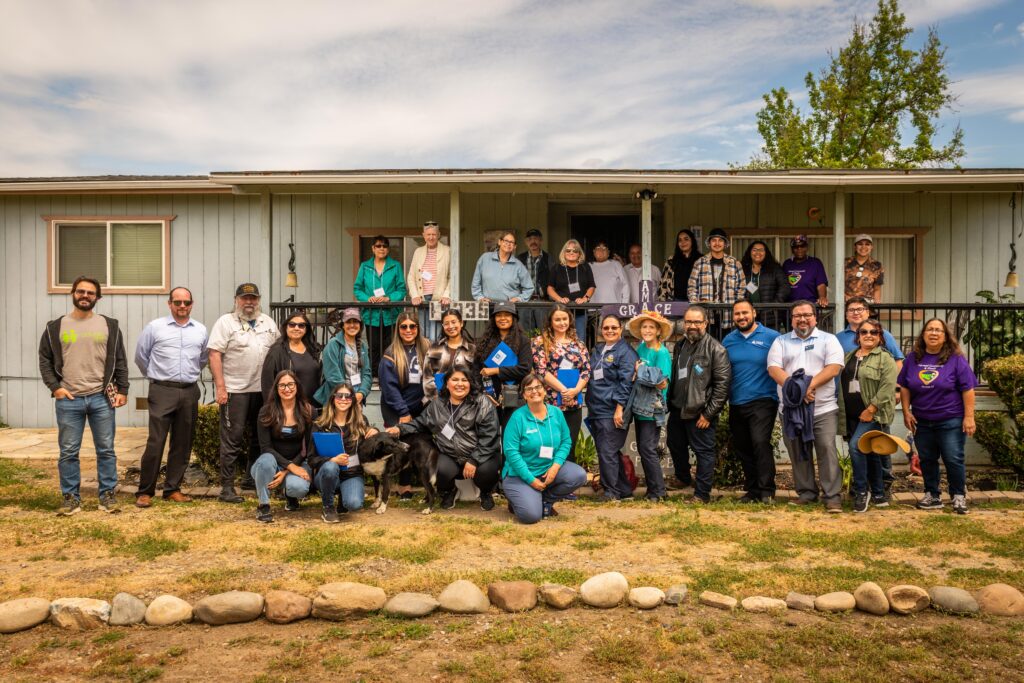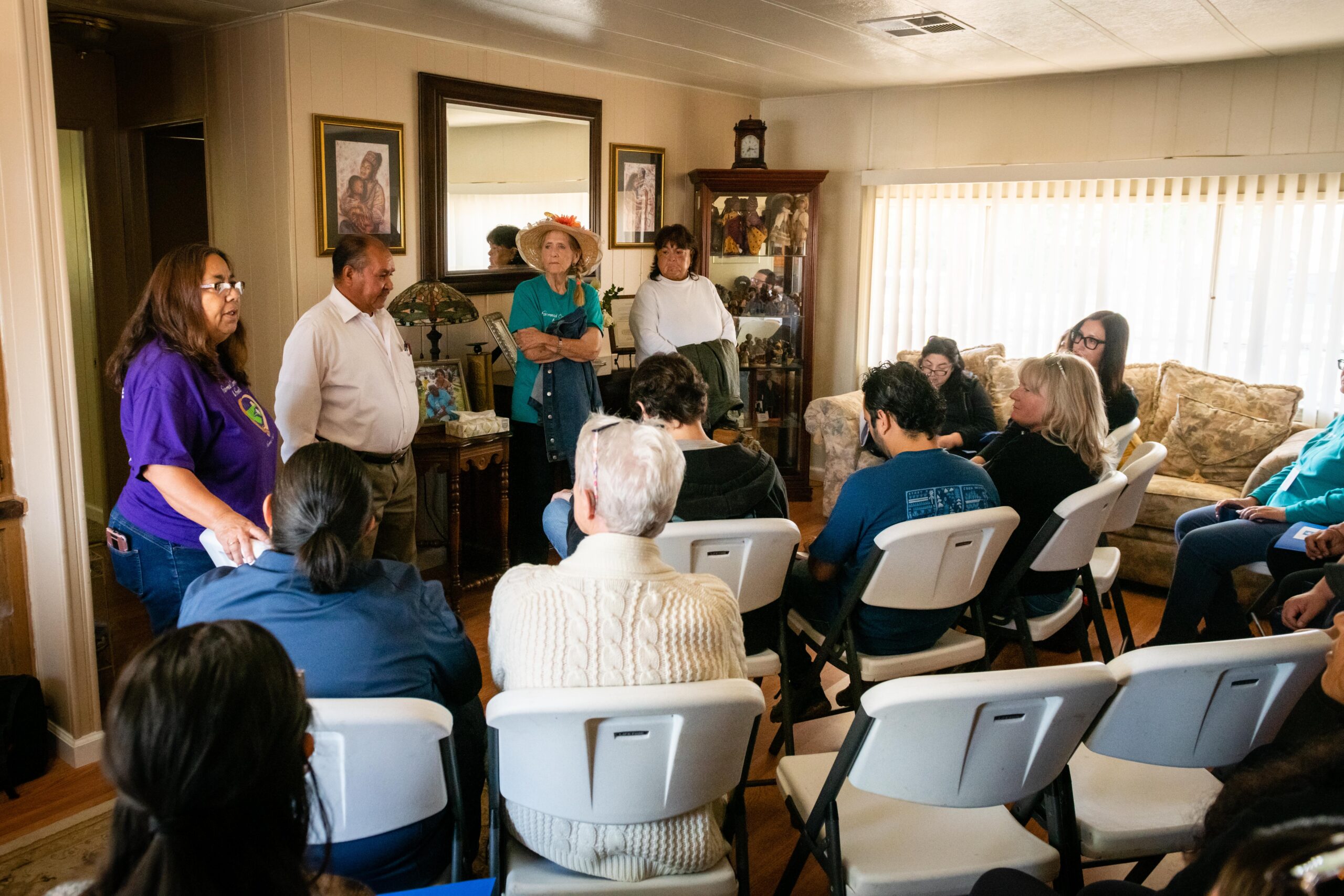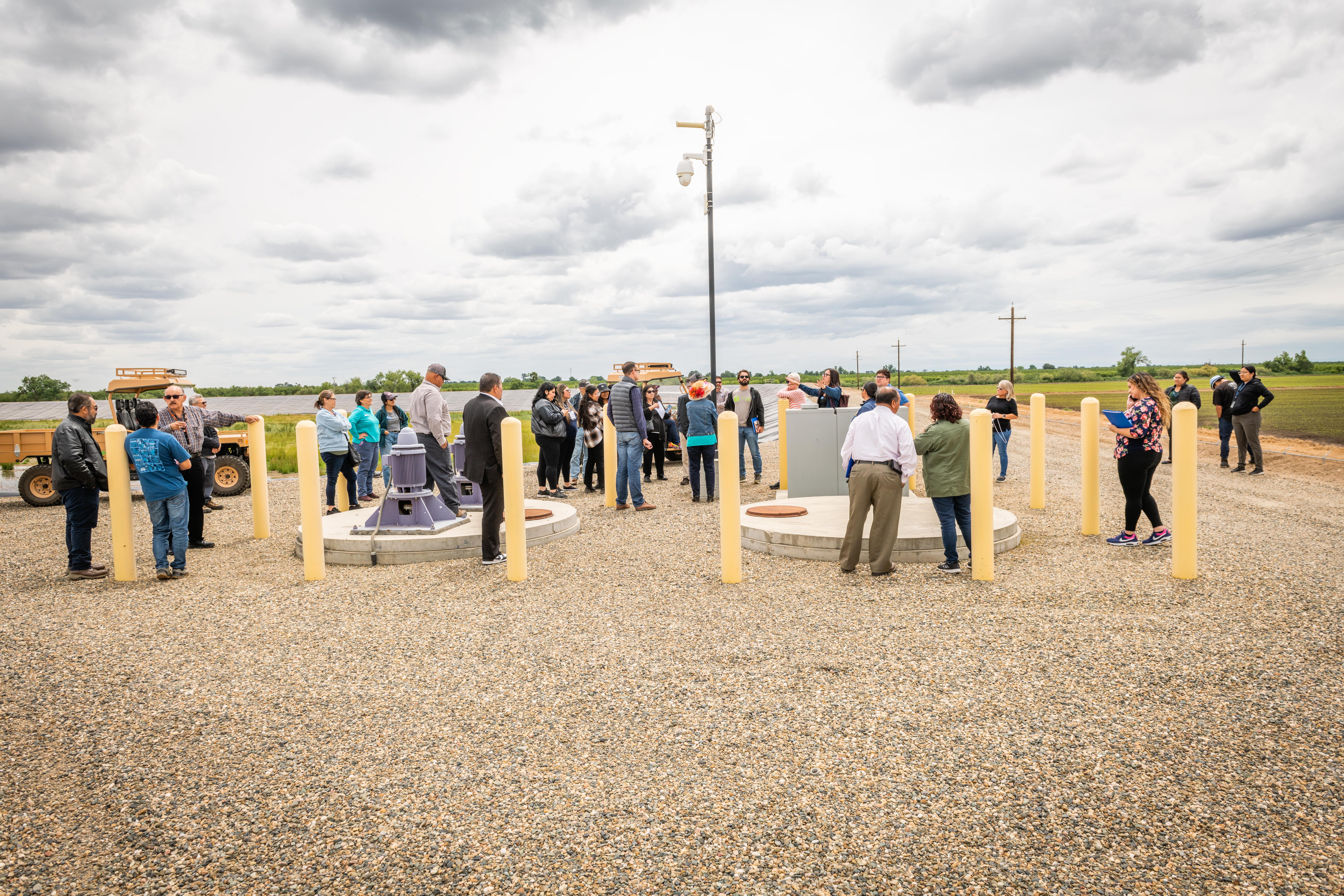North Valley Water Tour Centers on Building Water Resilience
North Valley Water Tour Centers on Building Water Resilience

Posted on May 31, 2023
On Wednesday, May 3, 2023, SHE’s Community Sustainability Department hosted its North San Joaquin Valley Tour in Madera and Merced Counties. Forty residents, speakers, guests, and staff traveled to Fairmead, Planada, and El Nido to learn about these communities’ history with water supply and management and how each prepares to become more resilient as major climatic events occur and are anticipated.

The tour kicked off in Fairmead, where Fairmead Community & Friends, a local nonprofit organization, shared the community’s experience with water and infrastructure challenges. During the previous drought, many domestic wells went dry in Fairmead as the water table plummeted far beneath residents’ wells. Many of these homes still rely on emergency water tanks and bottled water from the previous drought, and many domestic wells continue to run dry during the current drought. Fairmead’s approximately 11-year-old community well began drawing up air and sediment as the groundwater levels dropped below the pump level. In response, Madera County expedited the drilling of a second municipal well. While residents are relieved to have a second community well online, they are concerned that without bold regulatory action, history will repeat itself. Angela Islas of CivicWell discussed how important it is for state agencies to support rural communities, noting how residents such as those in Fairmead guide the state in filling in the resource gaps. Jason Rogers, Director of Public Works, also spoke in Fairmead to share how collaborative efforts have better supported Fairmead’s water needs.

The next stop included a visit to Planada, where residents heard from Olivia Gomez, Board Member, and Daniel Chavez, District Manager at Planada Community Services District, and Jose Gonzalez, Superintendent of Planada Elementary School. Each shared how coordination between the school and community services district was paramount to finding resources and working with FEMA to rebuild after the flooding that compromised several school buildings.
Tour participants also visited the Planada Wastewater Treatment Plant (WWTP) located southwest of the community. The WWTP helps avoid discharge into the local creek and serves as an aerobic six-pond system where water travels with gravity from pond to pond as it is treated with bugs. Solar panels are used to power the aerobic systems and provide oxygen for the bugs. The WWTP is seeking to install a solar battery system to continue reducing costs for the Planada CSD and build resiliency against flood impacts that can halt the system.
The water tour ended in El Nido’s historical schoolhouse that is now used as a Resident Hall. Longtime resident Anne Lewis spoke about her family’s history in El Nido as third-generation farmers and promoting agricultural education with young local residents. Pablo Ortiz-Partida and Angel Fernandez Bou from the Union of Concerned Scientists added how historical excess groundwater pumping for local dairies and foliage contributed to significant land subsidence. According to USGS, El Nido has a rate of nearly one foot per year, among the highest ever measured in the San Joaquin Valley. Subsidence can cause damage to local communities’ infrastructure and water infrastructures, such as already subsiding canals.
Recent Posts
- BCLT Groundbreaking Marks New Affordable Homes in Bakersfield!
- Celebrating NeighborWorks Week and 300th Home Milestone in Planada!
- Groundbreaking Marks New Chapter for Tombstone Water System
- Southwest Fresno Families Celebrate Their Self-Built Homes
- Celebrating the Grand Opening of River Grove in Oakhurst!
Recent Comments
Archives
- August 2025
- June 2025
- May 2025
- April 2025
- February 2025
- January 2025
- December 2024
- November 2024
- October 2024
- September 2024
- August 2024
- July 2024
- June 2024
- April 2024
- February 2024
- January 2024
- December 2023
- October 2023
- September 2023
- August 2023
- July 2023
- June 2023
- May 2023
- April 2023
- March 2023
- February 2023
- December 2022
- October 2022
- September 2022
- August 2022
- July 2022
- May 2022
- December 2021
- October 2021
- September 2021
- August 2021
- July 2021
- June 2021
- May 2021
- April 2021
- March 2021
- January 2021
- December 2020
- November 2020
- October 2020
- September 2020
- July 2020
- June 2020
- May 2020
- April 2020
- March 2020
- February 2020
- January 2020
- December 2019
- November 2019
- October 2019
- September 2019
- August 2019
- July 2019
- June 2019
- May 2019
- April 2019
- March 2019
- February 2019
- January 2019
- December 2018
- November 2018
- October 2018
- September 2018
- August 2018
- July 2018
- June 2018
- May 2018
- April 2018
- March 2018
- February 2018
- January 2018
- December 2017
- November 2017
- October 2017
- September 2017
- August 2017
- July 2017
- June 2017
- May 2017
- April 2017
- March 2017
- February 2017
- January 2017
- December 2016
- November 2016
- October 2016
- September 2016
- August 2016
- July 2016
- June 2016
- May 2016
- April 2016
- March 2016
- February 2016
- December 2015
- November 2015
- October 2015
- September 2015
- August 2015
- July 2015
- June 2015
- May 2015
- April 2015
- February 2015
